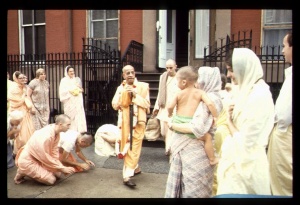SB 7.13.10

A.C. Bhaktivedanta Swami Prabhupada
TEXT 10
- avyakta-liṅgo vyaktārtho
- manīṣy unmatta-bālavat
- kavir mūkavad ātmānaṁ
- sa dṛṣṭyā darśayen nṛṇām
SYNONYMS
avyakta-liṅgaḥ—whose symptoms of sannyāsa are unmanifested; vyakta-arthaḥ—whose purpose is manifested; manīṣī—such a great saintly person; unmatta—restless; bāla-vat—like a boy; kaviḥ—a great poet or orator; mūka-vat—like a dumb man; ātmānam—himself; saḥ—he; dṛṣṭyā—by example; darśayet—should present; nṛṇām—to human society.
TRANSLATION
Although a saintly person may not expose himself to the vision of human society, by his behavior his purpose is disclosed. To human society he should present himself like a restless child, and although he is the greatest thoughtful orator, he should present himself like a dumb man.
PURPORT
A great personality very much advanced in Kṛṣṇa consciousness may not expose himself by the signs of a sannyāsī. To cover himself, he may live like a restless child or a dumb person, although he is the greatest orator or poet.